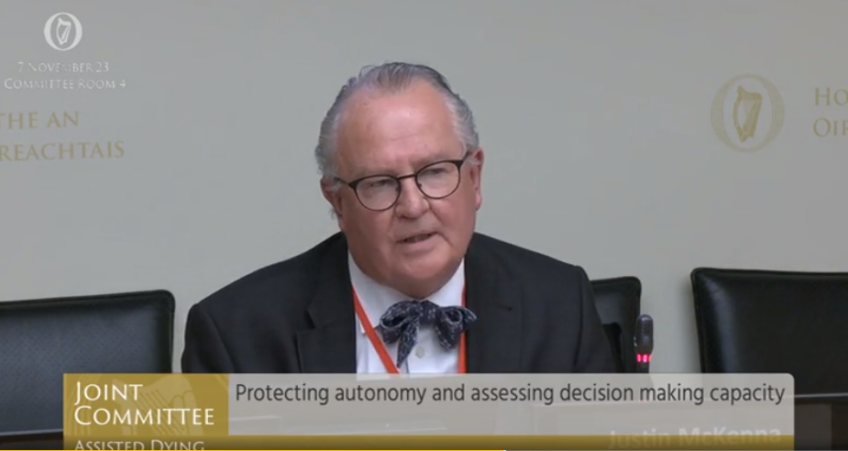
Patients with dementia should be offered euthanasia or assisted suicide, the Oireachtas Committee on ‘assisted dying’ has been told.
The Committee heard from representatives from End of Life Ireland that “assisted dying” should be introduced not only for terminally ill patients but also for those with neurodegenerative conditions such as dementia, who could be years away from death.
The general public can be easily confused by the expression “assisted dying”, but for those campaigners it clearly means not only assisting those who are dying soon but also a direct intervention to procure or facilitate death, if requested.
Ms Janie Lazar, chairperson of the organisation, told the Committee in heropening statement said that “assisted dying” should be offered even when death is not foreseeable: “We’re asking you as legislators, to honour a person who has a terminal or life limiting diagnosis. Because time alone, ‘foreseeable death’ ought not be the sole basis for calculating eligibility criteria; some neurodegenerative conditions can go on for years as we see with Dementia, with MS.”
Notably, none of the pro-euthanasia committee members objected. This is significant. They say they want the law in Ireland to be restricted to those supposedly within six months of death, but when people come before them demanding euthanasia and assisted suicide on much broader grounds than that, they have nothing to say. Their silence speakers volumes.
When asked to elaborate on euthanasia for dementia patients, another representative of End of Life, Mr Justin McKenna (pictured), said that patients can write an advanced healthcare directive and “in the context of dementia, I see the circumstances of the patient being relevant. The quality of the life of the person will have diminished to a point that is clinically intolerable within the grounds of that person’s determination and where there is no prospect of that quality improving by natural means.”
Notably, the TD who asked Mr McKenna to elaborate, Emer Higgins of Fine Gael, raised no objection to his line of reasoning.
Mr McKenna emphasised the distinction between ‘lifespan’ and ‘health span’. “They are not the same”, he said. “You can live with dementia for a very long time. We in this room will all know people who are in that condition and who could sustain a life, or perhaps an existence. However, is it healthy? Is it healthy in the way they would like it to be? In a previous time, when they had capacity and when they were able to determine what they regarded as quality, they should be allowed to maintain it and decide when it should end, if that quality no longer exists.”
This distinction between ‘lifespan’ and ‘health span’ has potentially huge implications. It appears to mean that a person should be offered euthanasia not when their life is nearly over, but when their health is nearly spent, whatever that may mean. If so, euthanasia would be available on very wide grounds indeed.
If patients with dementia can request euthanasia through advanced healthcare directives, this would entail killing them when someone judges they being mentally incapacitated, without a final explicit consent.
This proposal aligns with recent developments in Belgium and the Netherlands, where eligibility criteria for euthanasia have expanded to include psychiatric and neurodegenerative conditions. In Belgium, last year there were 21 cases of euthanasia for cognitive disorders, including dementia and Alzheimer’s, as well as 21 cases for psychiatric conditions.
In the Netherlands, the number of euthanasia deaths based on dementia increased by 34pc last year. According to the official report there were 288 cases of euthanasia for dementia and 115 for psychiatric conditions.
Some weeks ago, Theo Boer, a Dutch professor of healthcare ethics and former member of the Review Committee on Euthanasia, told the Oireachtas Committee: “I am convinced that it is only a matter of time before we take the next hurdle: allowing children of dementia patients to request euthanasia for their demented parents.”
In reply to End of Life Ireland shocking proposals, Senator Ronan Mullen spoke about his father’s illness: “I lived with and helped to care for my own father at home for approximately ten years during the time in which he suffered from Alzheimer’s. I can say that we did not let him miss out on anything he needed in order to deal with any pain, including sedation. I can also say that while he would have hated the way in which he became extremely dependent on us for the most basic necessities of life that enabled a climate of love and care in our family that I never could have imagined being possible. Regardless of what letter anybody might have written in the past about how they would like to be dealt with in the future if they should lose capacity, there is more to the story. There is the story of how the relationship with that person can continue.”
A climate of care and love is what patients with neurodegenerative conditions need. Euthanasia is not care and is not love.
Nessun commento:
Posta un commento